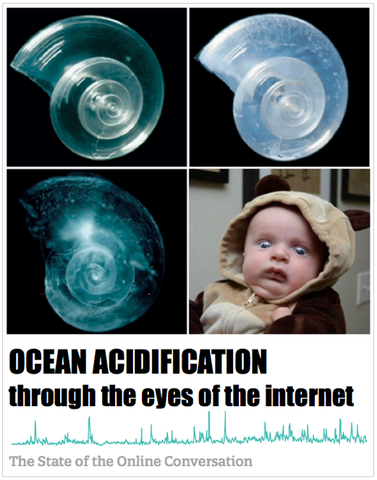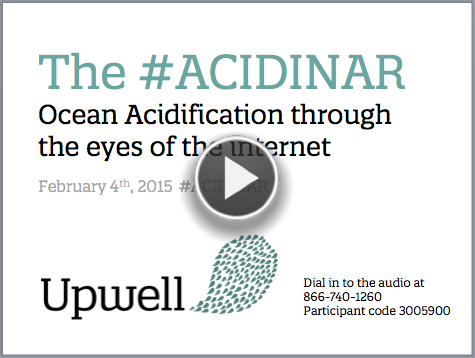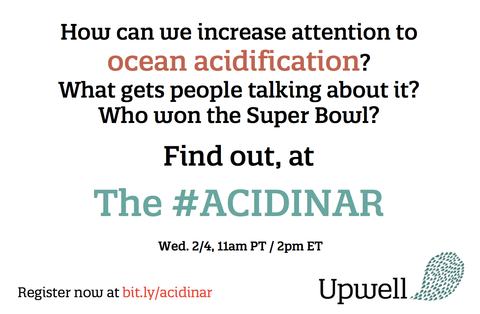Blog Feed
What's an Overfishinar? Glad you asked...
On Tuesday, March 3rd at 11am pacific we'll be gathering online for The Overfishinar - a webinar about using the internet to raise awareness and drive action on important overfishing and fisheries issues.
If you talk about overfishing or fisheries online, or if you're just overfishing-curious, join our crew of activists, scientists, bloggers, journalists, super-tweeters, and nonprofits to discuss how we can change the online conversation about overfishing in the best way, together.
During the Overfishinar we will:
- Share findings from Upwell’s new Big Listening report on overfishing and fisheries online conversation
- Provide tips for increasing the volume of overfishing mentions online to drive attention and action
- Answer your questions and discuss your takeaways, with an eye toward supporting each other's work
Sign up now to reserve your spot (it's free)!
For those of you who are Twitter inclined, we'll be using the hashtag #overfishinar to share the proceedings.
Happy internetting!
How can ocean conservation get more news coverage?
A conversation with Lindsay Abrams of Salon
This was originally published at Medium. Read the full interview there.
NGOs and journalists don’t have to act like oil and water, despite what individuals in each industry say when they get a chance to air their gripes. As my organization, Upwell, prepares to shut its doors, I wanted to make an effort to bridge the gap between the ocean conservation community and the news media. I reached out to a few journalist friends of Upwell to get their perspective on what makes a great ocean story, how ocean scientists and advocates can better work with them, and what drives engagement from their audiences.
Today I share the first of those conversations, with Lindsay Abrams of Salon.
Lindsay has a pretty broadly defined sustainability beat at Salon. In just the new year, she’s covered ocean topics like the long-term effects of the BP oil spill, Arctic drilling, ocean warming, mass extinction in our oceans, and more. As far as climate and sustainability reporters go, she’s one of the few giving the ocean its fair shake amongst other environmental topics.
A little background on why I approached Lindsay: For three years I have been leading campaigns for Upwell. By playing in online conversations for years and doing in depth conversational analysis, we’ve learned what drives attention to conservation issues. Time and again we find that news coverage is the primary driver of attention to lesser known ocean conservation issues. While topics like shark conservation and plastic pollution frequently garner attention in the absence of news coverage, more unfamiliar topics like ocean acidification or deep sea trawling need attention from journalists and bloggers in order to spark conversation.
People aren’t talking about ocean acidification of their own volition, at least not in droves. Not yet. People do start talking about it when they have something to share, and that “something” is most often a news article or a blog post from an established media platform. This doesn’t mean there aren’t exceptions (for instance, people-powered mobilisation, or attention motivated by pop culture influence), but it is the prevailing trend that we see in our Big Listening work. (For more on how people talk about ocean acidification, check out our recently released State of the Online Conversation report.)
I’m using the term “media” inclusively, to capture all shades of grey in today’s increasingly complex media landscape. Attention is driven not just by legacy media like the New York Times and the Washington Post, but also the media platforms that were born of the Internet like Quartz, Medium, Buzzfeed and Vox.
Despite this correlation between media coverage and attention, media relations and PR professionals in ocean nonprofits and scientific institutions struggle to craft the perfect pitch and share their content in a way that makes it likely to get covered by journalists and bloggers. My hope is that this interview will help people on both sides to do their jobs and raise attention to critical ocean conservation issues.
Read the full interview at Medium.com.
Relive the Acidinar, or discover it for the first time!
Dozens of oyster-loving members of Team Ocean joined us on Wednesday for The Acidinar, a sneak peak at findings from our latest State of the Online Conversation report on ocean acidification.
As promised, here's the Acidinar recording - minus (for privacy reasons) the lively Q&A discussion at the end.
For even more Acidinar goodness, you can...
- read or contribute to the google doc of collaborative notes (home to many excellent acidification-addressing projects submitted by attendees); or
- check out the #Acidinar highlights and conversation on Twitter
- grace your workspace with our handy ocean acidification Communications Cheat Sheet
As always, you can let us know what you think by emailing us at tips at upwell dot us or tweeting @upwell.
Let's keep the ocean acidification conversation going and growing.
Onwards!
Ocean Acidification: The State of the Online Conversation
Today we're happy to announce the release of our latest Big Listening research on critical issues of ocean and environmental health.
Ocean Acidification: The State of the Online Conversation
This report is the result of crunching more than 30 months of online data to distill insights and takeaways for ocean-loving communicators, scientists, campaigners, funders and anyone, really, who wants to use their internetting for change.

Take a look, and let us know what you think. We're all ears.
Executive Summary
Full Report
Ocean Acidification Communications Cheat Sheet (new)
We'll be sharing and discussing the findings later today on the #Acidinar webinar (11am pacific / 2pm eastern). We'll post the recording once it's done. 
Onwards!
Announcing... The #ACIDINAR
From the twisted minds who brought you the Upwell Sharkinar, comes the latest in our infamous webinar-inar series.
THE #ACIDINAR.
Whereas the Sharkinar is all about defending sharks online during Shark Week, the Acidinar is about using the internet for ocean acidification communications, including what can be done about it.
If you talk about acidification online, or if you're acidification-curious, join our merry band of activists, scientists, bloggers, journalists, super-tweeters, and nonprofits to discuss how we can change the online conversation about ocean acidification in the best way, together.
The Acidinar will be held on
Wednesday, February 4th, at 11am pacific / 2pm eastern.
Why not register now?
During the Acidinar we will:
• Share findings from Upwell’s new report, Ocean Acidification: The State of the Online Conversation
• Answer your questions and discuss your takeaways, with an eye toward mutual communications support
• Provide tips for increasing the volume and engagement level of ocean acidification online mentions
